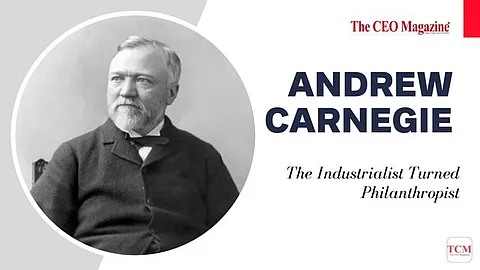
- News
- Women
- Magazine
- IndustryIndustry
- InsightsInsights
- Success Stories
- PublishPublish
- ContactContact
- Media KitMedia Kit

Andrew Carnegie
The Industrialist Turned Philanthropist
Andrew Carnegie, a name synonymous with both the rise of the American steel industry and unparalleled philanthropy, was born on November 25, 1835, in Dunfermline, Fife, Scotland. His life's journey from humble beginnings to becoming one of the most influential figures in American history is nothing short of remarkable.
His legacy is not just in the steel empire he built but in the countless educational, cultural, and charitable institutions he established, leaving an indelible mark on society.
Carnegie's father, William Carnegie, was a weaver and an advocate for workers' rights, while his maternal grandfather, Thomas Morrison, was a known agitator.
Economic hardship in Scotland prompted the Carnegie family to emigrate to the United States in 1848, where they joined a Scottish colony in Allegheny, Pennsylvania (now part of Pittsburgh). Andrew, at the age of 12, began working as a bobbin boy in a cotton factory but soon embarked on a journey of self-education, embracing American ideals.
By age 14, Carnegie was working as a messenger in a telegraph office, where he caught the attention of Thomas Scott, a superintendent of the Pennsylvania Railroad Company. Scott appointed Carnegie as his private secretary and personal telegrapher in 1853, marking the start of a meteoric rise.
Carnegie's role as superintendent of the railroad's Pittsburgh division in 1859 was a turning point, allowing him to make influential investments in the Keystone Bridge Company, the Union Iron Mills, and the Superior Rail Mill and Blast Furnaces.
Carnegie's venture into steel began around 1872-73 when he founded the J. Edgar Thomson Steel Works near Pittsburgh, laying the foundation for the Carnegie Steel Company.
Carnegie introduced revolutionary steelmaking processes, including the Bessemer method, and was an early adopter of cost- and production-accounting innovations, ensuring unparalleled efficiency.
By the 1890s, he had integrated vertically, acquiring the raw materials and transportation necessary for steel production. His company quickly dominated the American steel industry.
After selling the Carnegie Steel Company to J.P. Morgan for $480 million in 1901, Andrew Carnegie turned his attention to philanthropy.
In an influential essay titled "Wealth," he introduced the concept of the Gospel of Wealth, emphasising the moral obligation of the wealthy to use their fortunes for the betterment of society. Carnegie embodied this doctrine, and his lifetime contributions totalled around $350 million.
Carnegie's major charitable foundations included the Carnegie Trust for the Universities of Scotland, the Carnegie Dunfermline Trust, the Carnegie United Kingdom Trust, the Carnegie Institute of Pittsburgh, Carnegie Institution of Washington, Carnegie Endowment for International Peace, and Carnegie Corporation of New York.
These organisations supported education, research, cultural institutions, and the promotion of peace, leaving an enduring legacy.
Andrew Carnegie's life was a testament to the American Dream and the ideals of hard work, innovation, and philanthropy. From his beginnings as a bobbin boy in a cotton factory to becoming the steel magnate who revolutionised an industry, Carnegie's journey was extraordinary.
Yet, it is his unparalleled contributions to education, culture, and world peace that truly distinguish him. Carnegie's legacy is a reminder that wealth, when used wisely and for the benefit of others, can create a lasting impact, transcending generations and benefiting society as a whole.
Follow us on Google News
